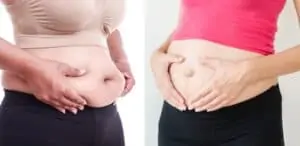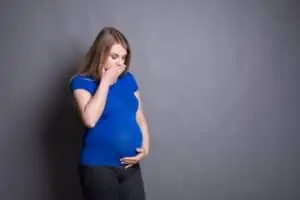When I was pregnant with my eldest, yet didn’t know it, I remember sliding into a pair of jeans that had fit me just the week before. Suddenly, they were uncomfortable with buttoning. I chalked it up to period bloating and chose another pair to wear.
It wouldn’t be until another couple of weeks before I realized I wasn’t just bloated…I was pregnant.
Certainly, there are some significant differences between having your period (or approaching the first day of your menstruation), but there are also quite a few similarities. I find this interesting since many of us tend to shake it off and think, “Nahhh, you’re just getting your period.”
Some women are actively trying to have a baby, while others are trying like heck to avoid it. That’s why knowing the difference between pregnancy and regular bloating is important.
Also, it helps to know the difference between a fat and a pregnant belly early.
Similarities Between PMS and Pregnancy Symptoms
If you’re approaching your period but worried that you’re pregnant (or hoping for that), some symptoms can help determine if it’s pregnancy bloating or PMS bloating.
But to complicate things, these two distinctive things share some big similarities. For one, you may experience breast tenderness with both PMS and pregnancy. You may also feel the need to pee more. I can tell you that these two things always happen to me right before I get my period, like every single time.
Additionally, fatigue, headaches, constipation, mood changes, and bloating are shared symptoms of these two very different stages in a woman’s cycle.
BUT!
There is a crucial difference. With breast tenderness and fatigue, they will go away, usually, once you start bleeding. For those of you that weren’t ready to do the mom thing (or are content with the number of children you already have), this usually elicits a sigh of relief. For women that have been trying to become mamas, though, this is disappointing, and I’m sending hugs your way!
Another symptom that may come up though with the bloating is a feeling of nausea. This is not usually something you’d experience with PMS.
Of course, the way to be sure is to take a pregnancy test if your period doesn’t show up when it’s supposed to. If you have irregular periods often, you want to speak with your doctor about this. Especially if you have fluctuations in your weight, thyroid problems, or are incredibly stressed.
Thankfully, there are many treatment options your doctor can help you with if you are not getting a regular period and you’re not pregnant.
Bloating vs. Pregnancy Bump
Many years ago, when my children were small, I remember restraining myself from punching someone in the face because they asked me when I was due.
I was not pregnant. I, in fact, had my period and had just had a calorie-fest with a mess of tacos, cheesy nachos, and guacamole. It was a food baby, as I like to call it. And that person was rude for presuming anything. Not like they were the picture of health themselves.
Anyway, bloating happens in pregnancy too. But if you wake up in the morning and your belly isn’t bloated anymore, you’re not pregnant. It was just food or digestive woes.
You can check to see the difference by lying down on your belly. You can do this on the floor or your bed though the floor is probably better since it won’t move. If you notice your belly squishes down into the floor, it’s bloating.
A pregnant belly feels more like you’re lying on top of a ball of some kind. Either way, it can’t hurt to take that pregnancy test to know for sure, especially if you’re late for your period.
Bloating in Pregnancy
While bloating is a very early pregnancy symptom, it also happens in the third trimester. Actually, it gets worse then. But the good news is that you know you’re pregnant by then.
In pregnancy, bloating will usually start around the 4th week or after. This is why it is so often confused with period bloating. Doctors count pregnancies from the first date of your last period. The earliest you could expect to experience pregnancy symptoms like bloating is around the time you should get your period if you have a standard 28-day cycle.
Since period bloating features cramps, tenderness of the breasts, and slight swelling, it is easy to confuse with early pregnancy bloating. But with early pregnancy bloating, you’ll likely have painful breasts that look much larger.
Remember what I was saying earlier about my jeans? Well, when I was putting on my bra, I felt my boobs were sore. But they also seemed bigger to me. I shook it off, and when I deliberately sought out food I hated because I was craving it, I knew.
Oh, and I want to clarify something too. You CAN have some nausea with PMS, which has happened to me on some occasions. However, when you are pregnant, that nausea is severe. It will likely limit your appetite, and you may even find that the bloating comes along with your weight loss.
Regardless, if you feel you might be pregnant, it is always wise to take a test. If it tests positive, go to your doctor to confirm it and get checked out.
Should I Worry About Bloating?
Most of the time, bloating isn’t a severe problem. It’s a common symptom of periods, PMS, and pregnancy. It usually indicates dietary intolerances or an unbalanced diet.
If you continue to experience bloating often, it’s wise to keep a journal of the foods you eat, your bowel movements, and your menstrual cycle. There may be correlations you can discuss with your doctor to help you reduce that bloating.
You should only worry if the bloating is severe and persistent with intense pain, nausea, vomiting, or unintentional weight loss. If this sounds like you, make an appointment with your doctor.
Is It Normal to Feel Pain During Bloating?
Yes, you can expect discomfort from bloating, especially if it’s gas. This happens to me sometimes, and once that gas moves out, I feel loads better. However, check things out if you feel pain as you bloat, and it doesn’t go away or worsen.
How to Reduce Bloating from Periods or Pregnancy?
Bloating for any reason can be uncomfortable, which is why you’ll want to do what you can to reduce it. If you notice it happens a lot, start journaling about the foods you eat. You may be intolerant to gluten or dairy, and then a simple diet change will relieve you.
Other foods can make you gassy, leading to bloating and pain. Keep an eye on beans, cabbage, broccoli, lentils, and salty foods you eat. Even carbonated drinks can cause bloating.
In addition to minding your food, exercise is a great way to reduce bloating. Make sure you’re getting some sort of physical activity each day. I love going for a brisk walk after I eat, which really helps keep my digestive system moving.
Now that you know the difference between pregnancy and period bloating, you can track your symptoms!
Leslie Berry lives with her husband and two young daughters in Los Altos, California, where she loves helping other moms get comfortable with motherhood and embracing the insanity with facts peppered with laughs.
She loves eating too much sushi, exercising, and jamming out on her Fender. Read more about Leslie here.


